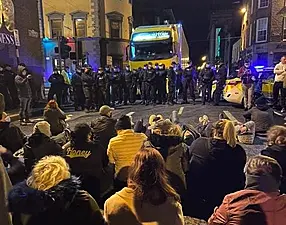
The High Court has overturned a previous ruling that could have resulted in hundreds of thousands of euros in compensation being paid to former Debenhams employees.
Judge Anthony Barr has overturned an Labour Court decision which ordered a clothing retailer to pay €1,140 to one of its sales assistants for failing to comply with its obligations under the Employment Protection Act 1977 to consult with employee representatives during the dismissal process.
The case was a test case for 792 other former employees.
In April 2020, Debenhams Retail Ireland went into voluntary liquidation and closed its stores in Ireland after its UK parent said it would not continue to fund the loss-making business. Debenhams was left in a state of extreme insolvency with minimal assets and huge debts, and the liquidation came in the midst of the first COVID lockdown, a court has confirmed.
The following month, workers picketed outside stores demanding four weeks’ compensation for every year of work, and the action continued for more than a year until the government created a fund to retrain and improve workers’ skills.
One of the shop assistants, Jane Crowe, went to the Workplace Relations Commission seeking dismissal with four weeks’ pay. The WRC arbitrator awarded her €1,140 in compensation and, after an appeal by Debenhams’ liquidators, the Labour Court upheld the decision.
The liquidators then appealed the decision to the High Court on legal grounds.
On Friday, Judge Barr allowed Debenhams’ appeal.
The judge noted that the Labour Court had found that Debenhams should have begun consultation with employee representatives shortly before Easter on 9 April 2020, when the board met to discuss the withdrawal of funding from its UK parent and also decided to go into voluntary liquidation.
However, the judge noted that a letter from a Debenhams director to a worker representative on 14 April, just after the Easter weekend, had begun the consultation process and also included information that all staff were to be made redundant.
The judge therefore held that the Labour Court had erred in law in deciding that the consultation process required under the 1977 Act had commenced with the meeting on 17 April 2020.
The judge also noted that he could not uphold the Labour Court’s finding that the delay from 9 to 17 April meant that some unspecified options were no longer available to employee representatives because provisional liquidators had already been appointed. That finding was made by the Labour Court without sufficient evidence, he noted.

Ireland Former Debenhams workers stage sit-in protest in… Read more
He said there was also no evidence that Ms Crowe had suffered any financial loss or additional distress as a result of the delay.
He noted that, from a legal perspective, Ms. Crowe had not suffered any loss as a result of the delay,
Sourse: breakingnews.ie